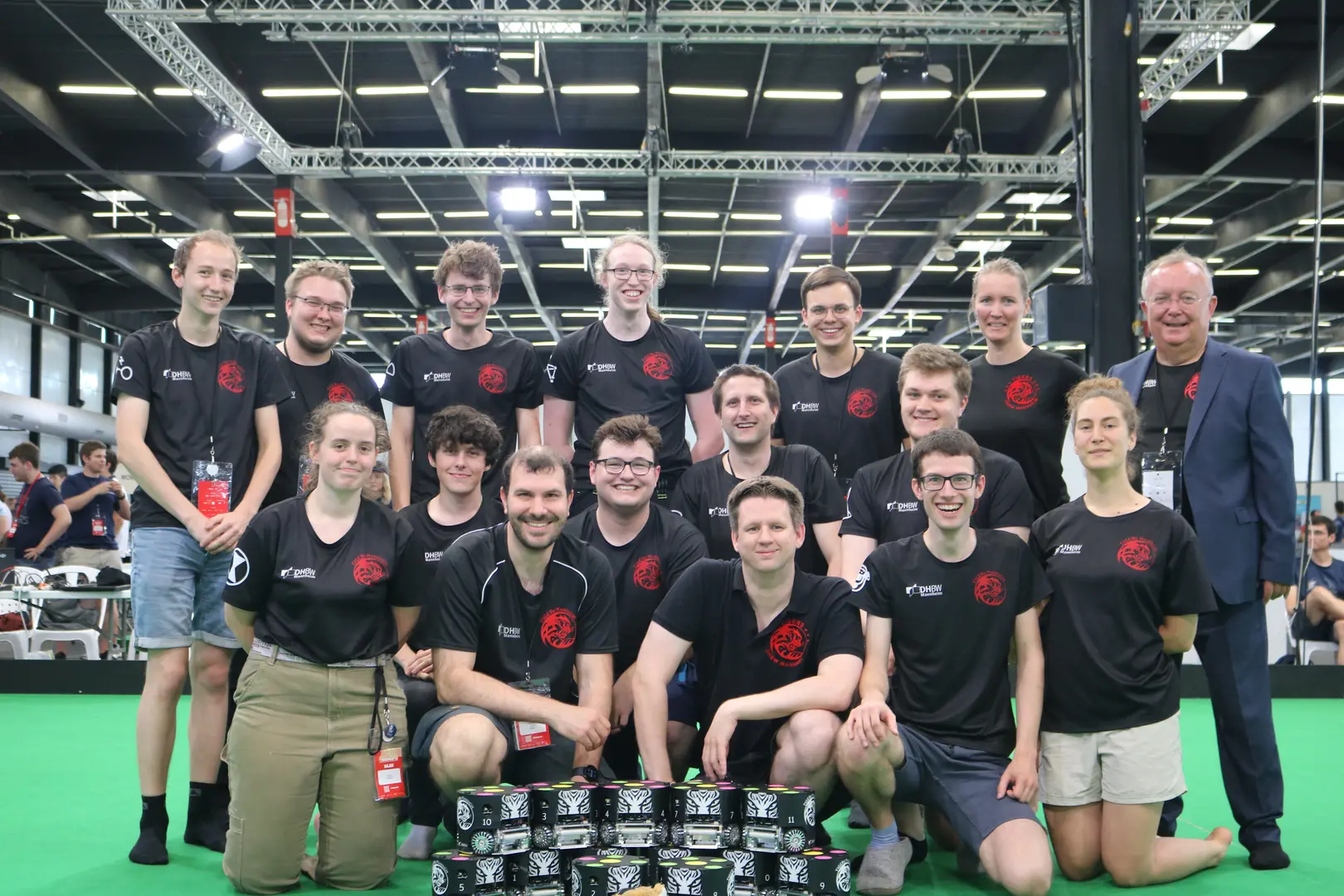2023 - Bordeaux, France

Six Tournament Days, Eleven (Test) Matches
Thanks to top-notch preparation and continuous learning from new game data during the tournament, the student team TIGERs from the Duale Hochschule Baden-Württemberg (DHBW) Mannheim once again won the title at this year’s RoboCup in robot football. The RoboCup took place from July 4th to 10th, 2023, in Bordeaux and concluded with an exciting final: the TIGERs faced Team ZJUNlict (Zhejiang University, China) and, after four goalless halves and a nerve-wracking penalty shootout, the winning team was finally determined. Not only did the TIGERs Mannheim secure the world championship title for the third consecutive year, but as in 2021 and 2022, they also won this year’s “Technical Challenge” and were additionally awarded the “Small Size Excellence Award” and the “Best Paper Award (ETDP)”.
TIGERs Shine with Sportsmanship and Expertise
It was the highlight of the TIGERs calendar, for which the DHBW Mannheim students had prepared for several months. And it was a special challenge as they were once again defending champions this year. They headed to the RoboCup at the University of Bordeaux two days before the tournament’s opening. 20 teams from around the world gathered to let their intelligent robots compete against each other in the Small Size League. The event started with the Technical Challenge: as many passes as possible in 5 minutes – a task where the TIGERs effortlessly triumphed with 798 points (5 points for a high pass, 1 point for a direct pass) compared to the second-best team KIKS from Japan with 167 points.
Gathering Game Data and AI Improvement
To collect game data and elevate the artificial intelligence (AI) in the football robots to a higher level, the TIGERs utilized their time between tournament games for a total of 6 test matches. Additionally, there was ample opportunity for exchanging ideas and mutual support with other teams. While the tournament is a competition, its core goal is the advancement of AI, where all participants contribute significantly to this promising research field. This principle fosters unity and is acknowledged: The RoboCup Federation awards the “Excellence Award” to the team that demonstrates sportsmanship and a willingness to share knowledge with the community, alongside success on the field. Here too, the Mannheim team impressed. Their third award was for the best Extended Team Description Paper (ETDP), which they had to submit for qualification to the RoboCup. The paper, describing new concepts, ideas, and learning experiences, is a key element of research and development in the Small Size League.
Exciting Finale Until the Last Minute
The intensive, sometimes 14-hour days and focused work on their robots paid off – after two group stage matches and two elimination stage matches, they reached the final. The opponent: the Chinese team ZJUNlict, a RoboCup team with a long successful history. To be well-prepared for the match, some good changes were spontaneously implemented the evening before. Despite very good passes, the four halves were not enough to decide the game. “Even before the game, I said it would be a miracle if we won a penalty shootout. Luckily, ZJUNlict did not expect a penalty shootout and did not implement it properly. Our shot was enough, and we won 3-0 after the penalty shootout,” rejoiced Mark Geiger, one of the project leaders, now an alumnus, who has been passionately involved with the TIGERs for ten years. Now, as three-time world champions, the TIGERs are only one title away from equaling ZJUNlict in the all-time best list.
DHBW Rector Cheers On-Site
The first to congratulate was Prof. Dr. Georg Nagler, Rector of DHBW Mannheim, who enthusiastically cheered for the DHBW team in Bordeaux. The joy of the team and the rector is shared by the entire university, proud of the exceptional performance and dedication of the TIGERs – and all this alongside their intensive studies at DHBW Mannheim. “To anyone wondering where the journey into a future also shaped by robotics is headed, I highly recommend visiting these RoboCup events. Whether industrial robotics, robotics in health and care, or in sports entertainment – much is developed here by students who, with great idealism, want to positively shape the future of our industrial society,” advises the rector. Prof. Dr. Nathan Sudermann-Merx, the scientific leader of the student project, who supports the team in organizational matters, also celebrates the victory: “I am incredibly proud of the TIGERs’ title win. Especially the final victory against the team from Zhejiang University, which has long been considered invincible, shows that the team has once again managed to improve at a world championship level.”
Background
The Small Size League is one of the oldest RoboCup football leagues. In a match in this league, two teams, each with eleven robots, compete against each other. Each robot must meet the specific size requirements: 18 cm in diameter and no higher than 15 cm. The robots play football with an orange golf ball on a green 12 x 9 m carpet field. During the game, all objects on the field are detected by a standardized image processing system that processes data from two cameras mounted on a 6 m high camera bar above the playing area. The data is processed in real-time by the teams’ computers located off the field, necessary for coordinating and controlling the robots. Communication is wireless using special commercial radio transmitters and receivers.
Project Leaders:
Andre Ryll (Senior)
Nicolai Ommer (Senior)
Mark Geiger (Senior)
David Brand
Friedrich Roth
Artificial Intelligence:
Nicolai Ommer
Mark Geiger
Michael Ratzel
Ulrike Leipscher
Jessica Zickgraf
Robin Lechartier
Antoine Monier
Media and PR:
Leni Novello
Colin Schubert
Ulrike Leipscher
Nils Piecha
Maintenance and Repair:
Andre Ryll
Lukas Thieser
Nils Piecha
Felix Weinmann
Colin Schubert
Motivation and Hugs:
Lilly
Schnuffel

